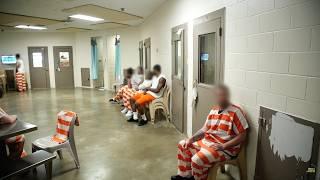
BOLIVIA: FAMILIES MOVE INTO PRISON COMPOUND TO BE WITH INMATES
(8 Jan 1997) Spanish/Nat
Jails in Bolivia are proving that incarceration is turning more and more into a family affair.
Women and children have moved in with their imprisoned spouses creating a small village within the enclosed walls of the prisons.
Bolivian jail authorities say they did not plan on this but they see it as a positive move in the rehabilitation of the inmates.
"La familia" - the family - is an integral part of Latin American culture and society - regardless of whether a person is in good or bad terms with the law.
And Bolivia is a prime example of the importance of family.
In this South American country families are key to prisoners' lives.
And jail life is becoming a family affair.
As jail populations increase, spouses and children are taking over the responsibility of looking after the inmates providing clothes, food, and everything they need to survive in prison.
In Bolivia, women and children have simply moved in with their imprisoned spouses.
Ironically it is in Bolivia where government neglect of inmates is greater and inmates depend to a large extent on their families.
Officials say over 12-hundred children live with one or both of their parents in jails throughout Bolivia.
The result is what looks like a small village enclosed within the walls of some of the country's largest prisons.
In the courtyards children play while men and women work on their projects, cook, clean and fend for themselves.
Bolivian jail authorities say they did not plan to have families sharing cells, but they say it is good for both the children and the inmates.
SOUNDBITE: (Spanish)
On one hand it's beneficial in the sense that they do not lose contact with their families and they will not be part of the large armies of street children or abandoned children. There's also the positive aspect that it helps the inmate in his rehabilitation - especially emotional and psychological. But there are also some negative sides, because no one asks the kids if they want to be there. Also there are limitations in their psychological and cognitive development due to enclosement.
SUPER CAPTION: Jose Luis Harb, Under-secretary for Penitentiaries
Others say prisons with families are less violent than those without them.
And the children seem to like it.
SOUNDBITE: (Spanish)
Q: How do you live here?
A: Happily
Q: Do you have friends? Tell me.
A: Yeah, I have friends and I play.
Q: Are you going to school?
A: I'll go to school.
SUPER CAPTION: Gonzalo Gonzales, inmate's son
SOUNDBITE: (Spanish)
I've been here for a year and a half with my mother.
Q: Do you go to school?
A: Yes, I got to school. I go out. I feel good being here.
SUPER CAPTION: Maria Cruz, inmate's daughter
The parents also feel good about having their children with them.
SOUNDBITE: (Spanish)
Q: Is it good company?
A: It's good to have my son by my side.
SUPER CAPTION: Fermin Zamora, inmate
Living conditions are not the best.
Still many inmates prefer to take part in their children's growth.
Similar programmes are in effect throughout Latin America and the United States may consider a similar project in the future.
Raising children under these conditions can be a nerve-racking task, but for these inmates, it is the most realistic choice in preventing a breakdown of the Bolivian family structure.
Find out more about AP Archive: http://www.aparchive.com/HowWeWork
Twitter: https://twitter.com/AP_Archive
Facebook: https://www.facebook.com/APArchives
Instagram: https://www.instagram.com/APNews/
You can license this story through AP Archive: http://www.aparchive.com/metadata/youtube/6d2c236616043a937f5e051cdfb78436
Jails in Bolivia are proving that incarceration is turning more and more into a family affair.
Women and children have moved in with their imprisoned spouses creating a small village within the enclosed walls of the prisons.
Bolivian jail authorities say they did not plan on this but they see it as a positive move in the rehabilitation of the inmates.
"La familia" - the family - is an integral part of Latin American culture and society - regardless of whether a person is in good or bad terms with the law.
And Bolivia is a prime example of the importance of family.
In this South American country families are key to prisoners' lives.
And jail life is becoming a family affair.
As jail populations increase, spouses and children are taking over the responsibility of looking after the inmates providing clothes, food, and everything they need to survive in prison.
In Bolivia, women and children have simply moved in with their imprisoned spouses.
Ironically it is in Bolivia where government neglect of inmates is greater and inmates depend to a large extent on their families.
Officials say over 12-hundred children live with one or both of their parents in jails throughout Bolivia.
The result is what looks like a small village enclosed within the walls of some of the country's largest prisons.
In the courtyards children play while men and women work on their projects, cook, clean and fend for themselves.
Bolivian jail authorities say they did not plan to have families sharing cells, but they say it is good for both the children and the inmates.
SOUNDBITE: (Spanish)
On one hand it's beneficial in the sense that they do not lose contact with their families and they will not be part of the large armies of street children or abandoned children. There's also the positive aspect that it helps the inmate in his rehabilitation - especially emotional and psychological. But there are also some negative sides, because no one asks the kids if they want to be there. Also there are limitations in their psychological and cognitive development due to enclosement.
SUPER CAPTION: Jose Luis Harb, Under-secretary for Penitentiaries
Others say prisons with families are less violent than those without them.
And the children seem to like it.
SOUNDBITE: (Spanish)
Q: How do you live here?
A: Happily
Q: Do you have friends? Tell me.
A: Yeah, I have friends and I play.
Q: Are you going to school?
A: I'll go to school.
SUPER CAPTION: Gonzalo Gonzales, inmate's son
SOUNDBITE: (Spanish)
I've been here for a year and a half with my mother.
Q: Do you go to school?
A: Yes, I got to school. I go out. I feel good being here.
SUPER CAPTION: Maria Cruz, inmate's daughter
The parents also feel good about having their children with them.
SOUNDBITE: (Spanish)
Q: Is it good company?
A: It's good to have my son by my side.
SUPER CAPTION: Fermin Zamora, inmate
Living conditions are not the best.
Still many inmates prefer to take part in their children's growth.
Similar programmes are in effect throughout Latin America and the United States may consider a similar project in the future.
Raising children under these conditions can be a nerve-racking task, but for these inmates, it is the most realistic choice in preventing a breakdown of the Bolivian family structure.
Find out more about AP Archive: http://www.aparchive.com/HowWeWork
Twitter: https://twitter.com/AP_Archive
Facebook: https://www.facebook.com/APArchives
Instagram: https://www.instagram.com/APNews/
You can license this story through AP Archive: http://www.aparchive.com/metadata/youtube/6d2c236616043a937f5e051cdfb78436
Тэги:
#AP_Archive #41475 #6d2c236616043a937f5e051cdfb78436 #BOLIVIA:_FAMILIES_MOVE_INTO_PRISON_COMPOUND_TO_BE_WITH_INMATES #Bolivia #Latin_America_and_Caribbean #General_newsКомментарии:
Cohen Media Group Logo
Ellyis Jakubowski
Heinz : Songs For A Swinging Party (1957)
Off The Turntable Music Archive
历史动作电影2018| 最新电影2018 【高清完整版】武术电影 2018
Cindy Chin
The 3 EASIEST Passive INCOME Ideas
Launch To Wealth TV
Speira Alumet V11
Alumet BV
15 Passive Income Ideas That ACTUALLY Work Start Now!
Cash Money Ideas
Jazz Education Network 2020 Conference Up Close
Jazz Education Network
Back at it...I think
KikkakeTK


























